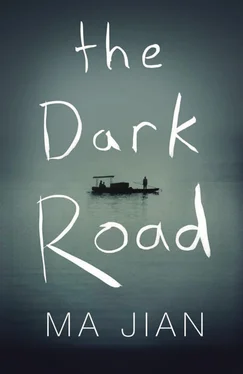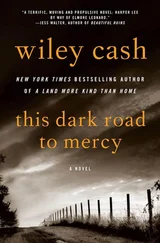‘Shut your mouths!’ the burly man at the front shouts, jumping to his feet.
‘This area’s nothing special,’ Suya says, noticing the look of wonder on Meili’s face. ‘See that TV tower? All the grand hotels and office blocks are there. A guest at one of those hotels offered me three thousand yuan to spend the night with him.’
‘I don’t want to hear about that,’ Meili says, feeling uncomfortable. ‘This city’s so huge. I bet it would take two days just to walk from one end to the other.’ She stares at the succession of shop windows, mesmerised by the televisions, leather sofas, denim jackets, high-heeled shoes, brogues, satin slippers… ‘I’d love to walk down this street. Not to buy anything, just to gaze into the windows.’
‘If you did what I do, in one year you’d have enough money to open a beauty salon, just like that one,’ Suya says, pointing to a window with a poster of a woman with long blonde hair, lying in a bath filled with bubbles.
‘I have a husband, and even if I didn’t, I’d still never do what you do.’
‘Why did you run away, then, if he’s so important to you? Why waste your youth living with a man you don’t love?’
Meili stays silent. Last night, she said to Suya, ‘I’ll never divorce Kongzi. As the saying goes: If you marry a chicken, you must follow the chicken.’ Suya laughed and told her she was a fool.
When the bus leaves the city, a green breeze carrying the scent of bamboo and wild grass blows in through the open window. Meili hasn’t washed for days, so she turns her face to it and inhales large draughts. The patches of leaked milk on her shirt begin to dry. When travelling by bus, the city and the countryside are only a few minutes apart, but for a peasant the distance always feels insurmountable. Meili is frustrated that although she’s not pregnant, she’s still considered to be a criminal for daring to enter a city. Her dream of living a modern urban life seems remote and unattainable.
At dusk, the bus reaches a village high in the hills and stops outside a compound of brick buildings. The two wooden signs outside the gate say YANG VILLAGE POLICE STATION and YANG VILLAGE LABOUR CAMP. In the setting sun they seem cast in bronze.
After supper, the village Party Secretary turns up. He spits out a toothpick, scoops some wax from his ear with his finger and says, ‘Comrades, welcome to the labour camp. Today is National Day, so we served you a local speciality: hot and numbing chicken. Delicious, wasn’t it?’ He breaks into a wide grin, but the forty inmates seated around him remain po-faced. ‘While you’re here you must abide by the rules and work hard. If your families pay the thousand-yuan bail, you can leave at once. If not, you’ll be with us for some time —’
‘I’m a welder at Compassion Villas construction site,’ interrupts a middle-aged man dressed in a grubby suit. ‘The foundations are going down this week. How will they manage without me?’
‘You should’ve thought about that before you wandered off-site,’ a village policeman says, jabbing his finger at him. ‘Now you’re here, you’ll have to do as you’re told.’ There are only three genuine policemen in the barn. The four others are local peasants dressed in the cheap uniforms of urban control officers that were probably bought in a local market. If these impostors were to enter a town or city, they would also be detained.
‘You will undergo re-education through labour and attend introductory classes in politics and law,’ the village Party Secretary continues. ‘We hope that you will use your time here well and make a valuable contribution to the modernisation of the village.’
‘I don’t understand why we’ve been brought to this camp,’ a woman at the back says. ‘We were taken to a Custody and Repatriation Centre. So why haven’t we been repatriated to our villages?’
‘Why is it a crime to leave the countryside to look for work? Which city in China hasn’t been built by migrants? Which factory in Guangdong, which Sino-foreign joint venture doesn’t rely on migrant workers? Are the authorities going to arrest every one of us?’
‘Yes, we migrants are the engines powering China’s miraculous economic rise. It said so in the newspapers. Don’t any of you know how to read?’
‘Foreign capitalists are flooding to China to take advantage of our cheap labour, so why are we branded criminals?’
‘I was told we were going to be sent back to our villages, so why have we been brought here to work like slaves?’
‘As I said, if your bail’s paid, you’ll be free to go,’ the Party Secretary repeats angrily, slipping back into his regional accent.
‘You bought us from crooked middlemen for five hundred yuan each, and now you want our relatives to pay you a thousand to release us? We’re being traded like cattle in a market. If it’s illegal for us to live in our own country, what do you expect us to do? Smuggle ourselves into Hong Kong?…’ All the inmates are on their feet now, gesticulating angrily and swearing.
‘Enough!’ the Party Secretary barks. ‘That’s it for tonight. Fill out the registration forms, take a handbook, and I’ll see you at seven tomorrow morning for the name call…’
After five days of hard labour in the fields, Meili gains the respect of her fellow inmates. While most of the women plant sugar cane, she helps the men with the back-breaking job of digging and filling irrigation channels. At dusk, when Suya collapses with exhaustion, she heaves her onto her back and carries her to the barn. Suya desperately wants to escape, but the nearest public road is thirty kilometres away. Two Sichuanese inmates attempted to flee three weeks ago, but as soon as they reached the road they were arrested, and were beaten so violently on their return to the camp that they’re still unable to walk.
‘That lecherous Instructor Zheng has got his eyes on me,’ Suya tells Meili. ‘I’m afraid to go out at night here. It gets so dark outside, you can’t see a thing.’ She and Meili have returned to the barn and are sitting on a tattered quilt, their backs against the wall. The ground is littered with laminate flooring offcuts and the scarves, underwear and broken flip-flops left behind by previous inmates. ‘Bloody Communist Party,’ Suya continues. ‘How dare they lock us up in this dump! Once I’ve made enough money, I’ll go and study abroad, and I’ll never come back.’ She grabs a scrap of flooring and wedges it behind her aching back, then puts a blanket over her legs.
‘I haven’t slept in a brick building like this for years, so it doesn’t feel like a dump to me,’ says Meili. ‘If you’re afraid of the dark, you should try sleeping on a boat at night. It’s not only pitch black, it rocks from side to side. You feel yourself floating in mid-air, with no idea where you might land…’ Then she rubs the mud from her hands and says, ‘So, has Inspector Zheng done anything to you?’
‘He took me aside today and said if I spent the night with him, I could leave the camp next week. I’d rather die than let that sleazy bastard put his hands on me. Besides, he’s a minor official — he has no authority to release any inmates.’
‘When you go to the latrines, I’ll go with you, and if he dares come near, I’ll sink my teeth into his shoulder!’
‘You’re so brave. Is there nothing you’re afraid of?’
‘Yes — the land. As soon as my feet touch firm ground, my heart starts pounding, because suddenly I’m a peasant again, a nobody who the government can arrest at will. I always feel safer on the water.’
‘Earth is man, water is woman, as the saying goes,’ Suya says. ‘Grains of soil are seeds of the masculine spirit; rivers are dark roads to the eternal female.’
Читать дальше












